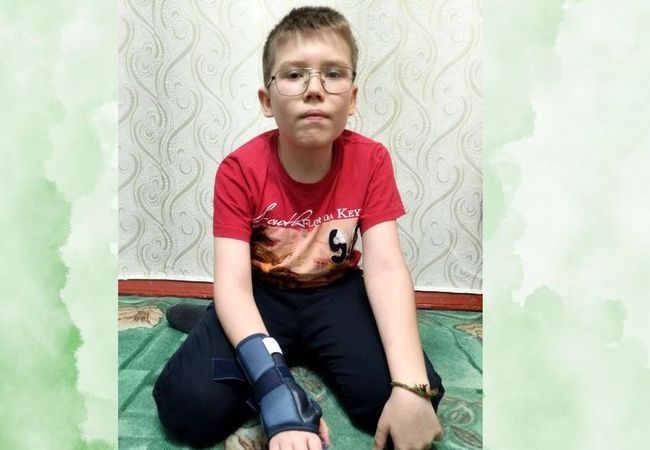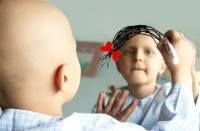World experience says juvenile cancer has a 70-90 percent cure rate

ZAPORIZHIA — “The lives of 120 children in Zaporizhia are threatened by leukemia and other blood disorders. The region’s only blood cell separator is out of service.” This was a news bulletin broadcast on Interkanal’s Podrobytsi in July 2006. Two months later I happened to learn that the problem has still not been resolved. To find out why, I visited the hematology ward of the regional children’s hospital in Zaporizhia.
A blood cell separator is a special device used to extract thrombocytes (cells responsible for coagulability) from donors’ blood. In cases of hemorrhaging, one or two doses of thromboconcentrate can save a patient’s life, especially in chemotherapy cases. Zaporizhia had one machine like this, but it broke down. The last produced dose was administered to a seven-year-old boy named Vladyk Havrylichev. The hemorrhaging was stopped, the child survived, and then his mother did all she could to get the broken separator replaced. She called the Inter channel and wrote to local newspapers. On Aug. 30 Vladyk had another hemorrhage. It could not be stopped without thromboconcentrate, and he died.
The Day asked Volodymyr Bessikal, the physician in charge of the regional children’s hospital, to comment. He assured me that “after parents concerned about their children created an uproar, the oblast council gave us money to buy a new separator. We’ll have it within a month.”
But parents do not believe in these promises. They say that “in a month” has been said ever since the oblast found itself without this necessary equipment. They are afraid to continue their children’s chemotherapy because it adds to the risk of hemorrhage. Without proper treatment every child will die of cancer. These parents are forced to choose the lesser evil. Parents with money and contacts in high places refuse to make this choice and are paying for their children to be treated in other clinics that have the necessary equipment and conditions required for such long-term complex treatment. But such parents are few, and most of them simply pray that their children do not have a hemorrhage.
When I was interviewing the parents of these children, I noticed that that those whose children have been sick for a long time talk with strangers and ask for their help directly. Those parents whose children were recently hospitalized mostly rely on their own resources. No one at the ward relies on any help from the government, which abandons parents to their problems as soon as their child is diagnosed. What the Ukrainian government is doing to help such children is just the proverbial drop in the ocean.
Everywhere else in the world juvenile cancer is considered curable in 70 to 90 percent of cases, depending on the form of the disease. There are effective treatments, and with every passing year this treatment becomes more finely tuned, which means that the ailing organism needs additional support. In Zaporizhia children are being treated with the same procedures, except that the survival rate is considerably lower. In the West doctors not only kill cancerous cells, but also struggle to alleviate the side effects of chemotherapy. Thromboconcentrate is always available in case of hemorrhaging. When a patient’s immunity falls to a critical level, they can administer special agents. Every ward is almost sterile, and chemotherapy is administered by special dosers.
Cancer-stricken children in Zaporizhia can only dream of being treated this way. There has been no thromboconcentrate supplied to this oblast for more than four months, and the clinic has never received any immunity-enhancing agents. Patients have to answer the call of nature by using a toilet in another section of the hospital. They have to shoulder their way through crowds of visitors, who cough and sneeze, and whose footwear has tracked in all sorts of bacteria. A special doser called Infuzomat is the only one in the ward, and it is donated by foreign sponsors. There are practically no chemotherapy agents, so parents of sick children have to buy them with their own money. Most families cannot afford these drugs.
“If not for some good people all over Ukraine and elsewhere, those who learned about our grief and donated money, I would have signed my child out of the hospital and taken him home,” says the grandmother of seven-year-old Vladyk Voliov. “Vladyk is an orphan. His mother died when he was three years old. We have to buy everything: cotton, alcohol, and very expensive chemotherapy agents and antibiotics. Even disposable syringes and IV drips are available in this ward only once in a while. As for Vladyk, his case became aggravated after chemotherapy, and he had to have a course of treatment that costs 400 hryvnias a day. How can an ordinary family afford this?”
Viktor Barabanov is another orphan whose treatment is almost completely financed by a young couple that decided to take care of the boy a year and a half ago. Their own daughter is 18 months old.
Olia Polonikova, a mother of three beautiful boys (Kyriush, the youngest, is only six months old) is paying for most of the required medicines. Her oldest son Ruslanchyk was diagnosed with acute leukemia. Later, he developed iron-deficiency anemia. It is anyone’s guess how this large family is coping with paying for the boys’ treatment and upkeep.
“If it hadn’t been for Ruslan’s sickness, we would have been the world’s happiest family,” says Olia, “but I am an orphan and my husband’s parents are middle-aged, so there is no one to look after my younger sons at home when I have to be away from the house with Ruslanchyk. The other kids take turns being here with me. My heart aches when I have to ask friends to take care of them. The main thing now is to cure Ruslan. Thank God, strangers are sending money for his treatment and special mixtures for Kyriusha. I don’t know how we could cope without this help.”
When I was studying my interviews with the parents of these sick children, I realized that they often mention their gratitude to ordinary people — pensioners, college students, men and women who have helped and sometimes even saved their children. I heard affectionate words about volunteers who try to find sponsors and help these sick children. In contrast, the official health service system has only been able to establish these wards and provide salaries for two physicians. Two doctors take care of 25 children with complicated illnesses.
Why are ordinary Ukrainians capable of saving the lives of children they have never seen? Why is the Ukrainian state abandoning these sick children?
According to local bureaucrats, there is one week left before the new blood cell separator is installed and put into operation. This is wonderful news, except it will never help Vladyk Havrylichev whose mother literally broke down office doors to obtain drugs for her son, who is no longer among the living.
* * *
Every year a dozen children are diagnosed with leukemia in Zakarpattia. Although this figure is relatively low based on nationwide statistics, it is high on the district and oblast levels. The impact of this disease on a single family is too painful to visualize. The terrible diagnosis bursts into a family home, devastates it, and teaches it to live with the disease.
This subject was discussed by a circuit session of Uzhhorod’s Reform Club. Journalists visited the regional children’s hospital in Mukachiv. Mykhailo Rad, the acting Chief Physician of the Zakarpattia Regional Children’s Hospital, said that his hospital treats approximately 10,000 children every year (medical treatment and consulting). Nearly 500 children need professional help from experts of the oncology and hematology departments. Some patients have relatively uncomplicated blood diseases and benign tumors. But every year a dozen leukemia cases are recorded in Zakarpattia. Blood diseases constitute one-third of all oncology cases. Treatment is very expensive, as child survivors have to be kept under constant medical surveillance for the rest of their life.
“Our little patients have not committed any sins against God and our people. Juvenile oncology cases are especially hard on families, they build up psychological tensions,” says Dr. Rad, who told me there are staff psychologists who work with families of sick children. As for the cost of treatment, the hospital has been receiving state funds for cancer treatments since 2002. The clinic was supposed to receive 300,000 hryvnias this year, but it has received no money to purchase drugs for cancer-stricken children.
Meanwhile, the cost of one round of treatment for one child with cancer is in the range of 10,000-15,000 dollars. Needless to say, no state funds can cover these costs. People who volunteer to help save children’s lives mostly rely on philanthropists, like the people are paying to save the lives of two children in Zakarpattia, who must have immediate bone marrow transplants.
Liubov Kulchykovska, head of the oncology-hematology ward, says that mercifully no increase in the incidence of leukemia has been recorded. Among the other causes of this fatal disease experts mention the ecological situation and heredity. A diagnosis established in Zakarpattia is always verified by experts from the Republican Oncology Center. According to Dr. Kulchykovska, 70 to 80 percent of patients can go into remission. If a patient feels well for five years, he is congratulated on his full recovery.
Tvii Yanhol (Your Angel) is the name of a national charitable foundation that was established this year. Its goal is to provide effective treatment for children afflicted with cancer. Foundation representatives and journalists recently visited the Zakarpattia Regional Children’s Hospital. Serhii Medvedev presented the foundation’s principles and urged the medical personnel of the oncology-hematology ward to apply for assistance. He said that Your Angel has helped the oncology ward at the Odesa Regional Children’s Hospital and the Kyiv oncology center by purchasing and donating expensive equipment.
The foundation is enlisting the help of a number of businesses and wealthy Ukrainian individuals by trying to revive the old Ukrainian tradition of philanthropy. The clients of Tvii Yanhol are young patients who have problems with their health, social adjustment, or physical or psychological development. These are children who cannot rely on full-fledged assistance from the Ukrainian state because the adults do not have enough money.
#34, Tuesday, 31 October 2006



